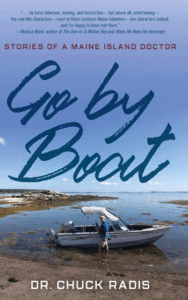Go By Boat: Stories of a Maine Island Doctor
By Chuck Radis (Down East Books, 2021)
Dr. Chuck Radis provides a front row seat to what life is like for a practicing doctor living on Peaks Island. Although he now practices rheumatology in Portland, he and his wife have lived on Peaks more than 30 years. This book traces the beginning of that career when, as he says, he didn’t even know how in over his head he was.
While attending medical school, he had been awarded a National Health Service Corps scholarship, requiring that recipients practice for a year in what the federal government deemed “health manpower-shortage areas.”
The book continues that theme: Radis convincing the unconvinced to let a doctor into their lives.
During his residency at the Osteopathic Hospital of Maine in Portland, he noticed Casco Bay islanders coming to the ER with undiagnosed or undertreated ailments like diabetes, emphysema, and hypertension, and most didn’t have a primary care physician. He wondered if the islands of Peaks, Long, Chebeague, and Cliff—with year-round populations—would utilize a local clinic and physician. (There was one on Peaks with very part-time hours). Radis scheduled informational meetings—an introduction to islanders that, to say the least, provided a shaky start—but ultimately earned him the support needed for his placement there.

The book continues that theme: Radis convincing the unconvinced to let a doctor into their lives. This isn’t an adrenaline-pumping narrative full of action-packed rescues or near-death saves. Instead, we get to observe a doctor’s careful analysis of symptoms and choices of treatment.
Of course, what a doctor knows and recommends is only half the story. Patients have their own reactions, and compromises are inherently involved. Some will resist hospitalizations, invasive procedures, medication regimes, or mental health care. Radis recognized the limits of his authority and found ways to stay involved, supportive, and compassionate.
We’re told at the book’s outset that only two characters are real and true to life, because they were already well-known to their communities. Other cases are composites. But the characters and issues he cobbles together are believable, especially as many reveal the quirks of native Maine islanders.
And talk about personality—we should all have a doctor like Radis. He may show up having forgotten something (a running joke is the wallet he can’t find), but he did house calls, has a calm and reflective bedside manner, and believes quality medical care should be affordable for all.
Radis’ description of medical issues can be fairly graphic and clinically detailed and, for this reader, sometimes cringeworthy. It made me wonder: who is the audience for this book? Is this a teaching tool for how diagnoses are determined? Or, an anecdotal field report for aspiring physicians, an appeal for people coming into the profession to consider lesser-paid work in a hardship locale?
The book gives Radis the opportunity to explain the difference between what he is, a D.O. (doctor of osteopathy) and an M.D. (doctor of medicine). While both are licensed to do the same things and practice medicine in its entirety, the osteopathic philosophy involves a more holistic approach, less reliant on medications and medical procedures.
Readers familiar with the difficulties of getting off-island in health emergencies will appreciate the descriptions of help provided by members of the community, whether from the rescue boat or ferry crew, or with a borrowed boat. Despite the abundance of services on the mainland, Radis found many averse to leaving, afraid of longer-term stays in a facility there.
“I found that islanders were plainspoken, hardheaded, and resilient. And they were a royal pain in the butt. They should have died—but almost never did. Once they were brought back from death’s door, they demanded to be discharged. They frequently signed out against medical advice.”
But despite that complaint, Radis’ affection and admiration for his patients is clear. He understood that their community provided another kind of “care” and could be good medicine in and of itself. To that end, these days he is active on Peaks helping develop an assisted living facility and lobbying for senior housing. Aging in place turns out to be just what the doctor ordered.
Tina Cohen is a seasonal resident of Vinalhaven. She is employed as a mental health therapist working with families through the juvenile courts.





